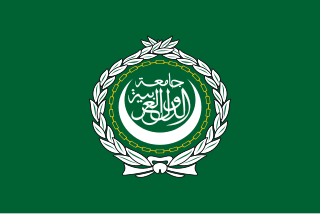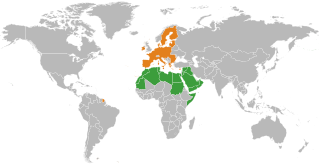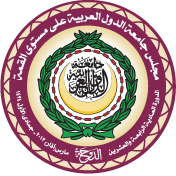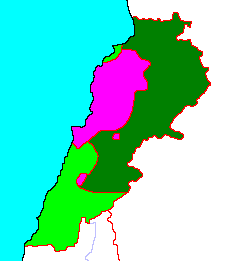
The Arab League, formally the League of Arab States, is a regional organization in the Arab world. The Arab League was formed in Cairo on 22 March 1945, initially with six members: Egypt, Iraq, Transjordan, Lebanon, Saudi Arabia, and Syria. Yemen joined as a member on 5 May 1945. Currently, the League has 22 members.
The Beirut Summit was a meeting of the Arab League in Beirut, Lebanon, in March 2002 to discuss the Israeli–Palestinian conflict. At the time Yasser Arafat, the Leader of Palestine, was under house-arrest in his Ramallah compound. The Israeli forces confined him and prevented him from attending the Beirut Summit.
The Arab Deterrent Force was an international peacekeeping force created by the Arab League in the extraordinary Riyadh Summit on 17–18 October 1976, attended only by heads of state from Egypt, Kuwait, Lebanon, Saudi Arabia, and Syria. It decided to transform the 'token' Arab Security Force into the Arab Deterrent Force. A week later, the conclusions of the Riyadh Summit were endorsed and implemented by the Arab League's Cairo summit on 25–26 October 1976.

The Headquarters of the Arab League is located in Tahrir Square and near the downtown business district of Cairo, Egypt. The headquarters building has views of the Nile River and Qasr al-Nil Bridge just to the west.

The Arab Peace Initiative, also known as the Saudi Initiative, is a 10 sentence proposal for an end to the Arab–Israeli conflict that was endorsed by the Arab League in 2002 at the Beirut Summit and re-endorsed at the 2007 and at the 2017 Arab League summits. The initiative offers normalisation of relations by the Arab world with Israel, in return for a full withdrawal by Israel from the occupied territories, with the possibility of comparable and mutual agreed minor swaps of the land between Israel and Palestine, a "just settlement" of the Palestinian refugee problem based on UN Resolution 194, and the establishment of a Palestinian state with East Jerusalem as its capital. A Palestinian attack called the Passover massacre took place on 27 March 2002, the day before the Initiative was published, which initially overshadowed it.

The Arab League or League of Arab States was founded by Egypt in 1945, has 22 members and seven observer members so far: Armenia, Brazil, Chad, Eritrea, Greece, Republic of India, Venezuela.

The 2007 Arab League Summit, also called the 2007 Riyadh Summit, refers to a convention of leaders from 21 members of the Arab League who gathered in Riyadh for the 19th Arab summit in March 2007. The summit convened on the 28 March 2007 and was preceded by a set of preparatory meetings starting on 24 March 2007. United Nations Secretary General Ban Ki-moon and the European Union's foreign policy chief Javier Solana also attended the summit. The main goal of the conference was to re-launch the Arab Peace Initiative.

The 1978 Arab League summit was meeting held between Arab leaders between 2–5 November in Baghdad as the 9th Arab League Summit. The summit came in the aftermath of the Egypt's Anwar Sadat's unilateral peace treaty with Israel. On 31 March 1979, five days after the ratification of the Egypt-Israel Peace Treaty, Arab leaders again convened in Baghdad in the absence of Egypt and decided to expel it from the Arab League. Consequently, the secretariat of the League was moved out of its Cairo headquarters to Tunis. This decision was slowly reversed in the 1980s after president Hosni Mubarak ascended to power. Egypt, which regained strong influence in the region as rival nation Syria was suffering setbacks during the Lebanon Civil War, returned to the Arab League on 23 May 1989 and the headquarters, which never saw completed construction in Tunis, return to Cairo on 12 March 1990.
The 1976 Arab League summit was held on October 16 in Riyadh, Saudi Arabia, as an extraordinary Arab League Summit. The summit came in the aftermath of the escalating civil war in Lebanon. It was attended only by representatives from Saudi Arabia, Egypt, Syria, Kuwait, Lebanon and the Palestinian Liberation Organization. The summit called for an end to the civil war and for the PLO to respect Lebanese sovereignty.
The 2008 Arab League summit was held in Damascus on March 29, 2008. The summit was marred by inter-Arab differences, mainly over the political deadlock in Lebanon, with relations between Syria and the Saudi-Egypt coalition reaching an all-time low. Saudi Arabia and Egypt snubbed the summit by sending low-level representatives. Lebanon's majority government boycotted the summit

The Arab League and European Union have shared relations since the EU's development into a more political power rather than an economic one. At the 19th summit of the Arab League in Saudi Arabia, Javier Solana attended the summit. He gave the EU's full support to the Arab League's Peace Initiative of 2002. At the summit, he addressed the Arab Leaders:

The Economic and Social Council of the Arab League is an institution of the Arab League that co-ordinates its economic integration. The ESC was established as the Economic Council under the terms of the Joint Defence and Economic Co-operation Treaty (1950). and held its first meeting in 1953. In 1957, the ESC established the Council of Arab Economic Unity (CAEU) and, in February 1997, the ESC adopted the Agreement to Facilitate and Develop Trade Among Arab Countries (1981) in pursuit of the Greater Arab Free Trade Area (GAFTA).

Arab-Pakistan relations refer to foreign relations between Pakistan and the various states of the Arab world which constitute the Arab League.

Al Riyadh is a Riyadh-based, pro-government Saudi daily newspaper. Its sister paper was Riyadh Daily that was in circulation between 2003 and 1 January 2004. Al Riyadh is one of the dominant papers in Nejd.

The 2013 Arab League Summit was held in Doha, Qatar from 21 to 27 March 2013.

Saudi Arabia–Syria relations refer to bilateral and economic relations between Saudi Arabia and the Syrian Arab Republic. Diplomatic ties between these two countries of the Middle East have long been strained by the major events in the region. Saudi Arabia has an embassy in Damascus, and Syria has an embassy in Riyadh. Both countries are members of the Arab League and share close cultural ties.

The 2017 Riyadh summit was a series of three summits held on 20–21 May 2017 on the occasion of the visit of United States President Donald Trump to Saudi Arabia, his first trip overseas. The summit included one bilateral meeting, between the United States and Saudi Arabia, and two multilateral meetings, one between the members of the Gulf Cooperation Council and the other with Arab and Muslim countries. Leaders and representatives of 54 Arab and Muslim countries, all members of the Organisation of Islamic Cooperation, and the United States took part. Iran and Turkey boycotted the summit, and Syria was not invited.
The 2018 Arab League Summit was the Arab League's 29th summit held in Dhahran, Saudi Arabia on Sunday, 15 April 2018. The Summit was initially expected to be held in Riyadh. A preparatory meeting was held in Riyadh on Thursday, 12 April 2018 which was presided over by the Saudi Minister of Foreign Affairs Adel al-Jubeir. Foreign Ministers of the 22 countries attended the meeting.

Syria intervened in the Lebanese Civil War in 1976, one year after the breakout of the war, as Syrian military began supporting Maronite militias against the Palestine Liberation Organization (PLO) and leftist militias. Syria also raised a proxy militia of its own, the Palestine Liberation Army (PLA). Hafiz al-Assad's primary objective was to suppress the rise of PLO and allied pro-Palestinian militias in Lebanon which toed a hardline stance against Israel; and the invasion received widespread rebuke in the Arab world.
The 2022 China-Arab States Summit was the 1st summit of the heads of state and representatives of 21 countries of the Arab League, and the head of state of the People's Republic of China. It was held on 9 December 2022, in Riyadh, Saudi Arabia.










